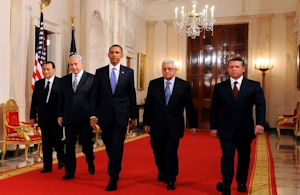
WASHINGTON, D.C. (WJC)–Following a first round of direct talks between the Israeli and Palestinian leadership, US President Barack Obama said that parties were making progress on the Middle East peace process. He also said the talks were productive, but gave no specific details.
Israeli Prime Minister Benjamin Netanyahu and Palestinian President Mahmoud Abbas ended Thursday’s meeting in Washington with an agreement to talk again on 14 and 15 September, and every two weeks thereafter, fast-tracking a peace push that is one of Obama’s top priorities. Egyptian President Hosni Mubarak and Jordanian King Abdullah were also in the US capital to take part in the direct talks, the first since Prime Minister Netanyahu took office 18 months ago.
Secretary of State Hillary Clinton urged both sides to overcome the final obstacles to peace, saying their new talks may be a last chance to end the conflict. Clinton told reporters that skepticism and suspicion could not be allowed to derail the talks as has happened so many times in the past.
“It is clear to me that the forces of growth and positive energy are in a conflict with the forces of destruction and negativity. And the United States wants to weigh in on the side of leaders and people who see this as maybe the last chance for a very long time to resolve this.”
Clinton has in the past described the rising risks both sides face, saying “the dynamics of demography, ideology and technology” threaten to produce more extremist groups with better weapons dedicating to a violent solution to the conflict. She said it was important both sides now take concrete steps to improve conditions on the ground, particularly in areas where Palestinians and Israelis come into direct contact. “So the checkpoints, the roadblocks, all of the daily challenges that we know affect the Palestinians, are certainly on the agenda,” Clinton said.
“I think the political negotiations need to be matched with changes on the ground, and confidence-building and interactions between Israelis and Palestinians.” Clinton acknowledged the challenges ahead for both Abbas and Netanyahu, but said both leaders realized the imperative for their peoples to find a solution. “These two men, perhaps for different reasons, may be the two who can actually do this,” she said.
Meanwhile, Israel’s Foreign Minister Avigdor Lieberman said that his Yisrael Beiteinu party would try to block any extension of the moratorium on construction in West Bank settlements. Lieberman said the Israeli government must keep its promise to voters that the ten-month building moratorium, declared last November, would end as scheduled at the end of the month. “A promise is a promise,” Lieberman told ‘Israel Radio’.
“We will not agree to any extension. I promise that if there’s a proposal that we don’t accept it will not pass,” he added. However, in a sign that a compromise was possible Lieberman told the newspaper ‘Yediot Ahronot’ that he would not quit the coalition even if he does not get his way. “We will not leave or bring down the government. We will fight from the inside for what we believe,” he declared. He also voice skepticism regarding the possibility of a peace agreement within the next twelve months.
Meanwhile, President Abbas has made it clear that he would not continue with peace talks if Israeli settlement construction resumes.
*
Preceding provided by World Jewish Congress